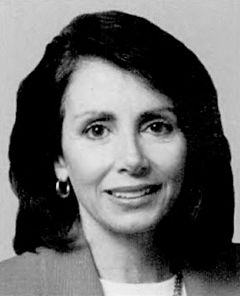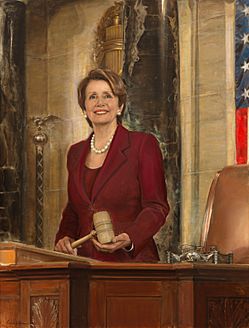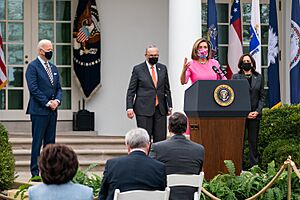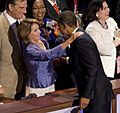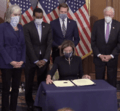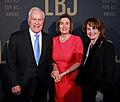Nancy Pelosi facts for kids
Quick facts for kids
Nancy Pelosi
|
|||||||||||||||||||||||||||||||||||||||||||||
|---|---|---|---|---|---|---|---|---|---|---|---|---|---|---|---|---|---|---|---|---|---|---|---|---|---|---|---|---|---|---|---|---|---|---|---|---|---|---|---|---|---|---|---|---|---|
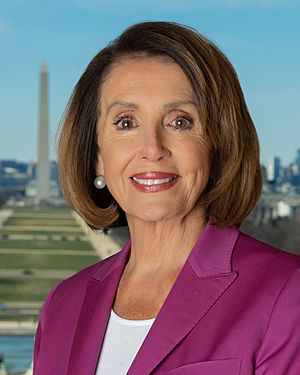
Official portrait, 2019
|
|||||||||||||||||||||||||||||||||||||||||||||
| 52nd Speaker of the United States House of Representatives | |||||||||||||||||||||||||||||||||||||||||||||
| In office January 3, 2019 – January 3, 2023 |
|||||||||||||||||||||||||||||||||||||||||||||
| Preceded by | Paul Ryan | ||||||||||||||||||||||||||||||||||||||||||||
| Succeeded by | Kevin McCarthy | ||||||||||||||||||||||||||||||||||||||||||||
| In office January 4, 2007 – January 3, 2011 |
|||||||||||||||||||||||||||||||||||||||||||||
| Preceded by | Dennis Hastert | ||||||||||||||||||||||||||||||||||||||||||||
| Succeeded by | John Boehner | ||||||||||||||||||||||||||||||||||||||||||||
|
|||||||||||||||||||||||||||||||||||||||||||||
| Member of the U.S. House of Representatives from California |
|||||||||||||||||||||||||||||||||||||||||||||
| Assumed office June 2, 1987 |
|||||||||||||||||||||||||||||||||||||||||||||
| Preceded by | Sala Burton | ||||||||||||||||||||||||||||||||||||||||||||
| Constituency |
|
||||||||||||||||||||||||||||||||||||||||||||
| Chair of the California Democratic Party | |||||||||||||||||||||||||||||||||||||||||||||
| In office February 27, 1981 – April 3, 1983 |
|||||||||||||||||||||||||||||||||||||||||||||
| Preceded by | Richard O'Neill | ||||||||||||||||||||||||||||||||||||||||||||
| Succeeded by | Peter Kelly | ||||||||||||||||||||||||||||||||||||||||||||
| Personal details | |||||||||||||||||||||||||||||||||||||||||||||
| Born |
Nancy Patricia D'Alesandro
March 26, 1940 Baltimore, Maryland, U.S. |
||||||||||||||||||||||||||||||||||||||||||||
| Political party | Democratic | ||||||||||||||||||||||||||||||||||||||||||||
| Spouse | |||||||||||||||||||||||||||||||||||||||||||||
| Children | 5, including Christine and Alexandra | ||||||||||||||||||||||||||||||||||||||||||||
| Relatives | Thomas D'Alesandro Jr. (father) Thomas D'Alesandro III (brother) |
||||||||||||||||||||||||||||||||||||||||||||
| Education | Trinity College, Washington (BA) | ||||||||||||||||||||||||||||||||||||||||||||
| Awards | Presidential Medal of Freedom (2024) | ||||||||||||||||||||||||||||||||||||||||||||
| Signature | |||||||||||||||||||||||||||||||||||||||||||||
| Website | |||||||||||||||||||||||||||||||||||||||||||||
Nancy Patricia Pelosi (born March 26, 1940) is an American politician who served as the 52nd speaker of the United States House of Representatives. She held this powerful job twice, from 2007 to 2011 and again from 2019 to 2023. As a member of the Democratic Party, she made history as the first woman ever elected to be Speaker of the House.
Pelosi has been a member of the U.S. Congress since 1987, representing a large part of San Francisco, California. She was the leader of the Democrats in the House of Representatives from 2003 to 2023. This made her the first woman to lead a major political party in Congress.
During her time as Speaker, Pelosi played a key role in passing important laws. These included the Affordable Care Act, a major healthcare reform law, and the American Recovery and Reinvestment Act of 2009, which was created to help the economy. She also led the House during two impeachments of President Donald Trump.
After the Democratic Party lost its majority in the House in the 2022 elections, Pelosi stepped down from her leadership role. She continues to serve as a representative for her district in California.
Early Life and Family
Nancy Pelosi was born in Baltimore, Maryland, to an Italian-American family. She was the youngest of six children and the only daughter. Her father, Thomas D'Alesandro Jr., was a Democratic congressman and later became the mayor of Baltimore. Her mother was also active in politics, organizing women for the Democratic Party.
From a young age, Pelosi helped her father with his political campaigns. She was inspired by President John F. Kennedy and his call to public service. In 1962, she graduated from Trinity College with a degree in political science.
Start of Her Political Career
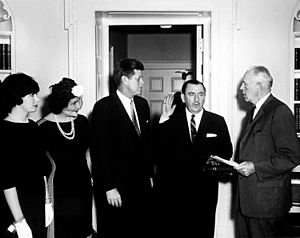
After college, Pelosi married Paul Pelosi and moved to San Francisco. While raising her five children, she began volunteering for the Democratic Party. She became friends with Congressman Phillip Burton, a powerful local politician.
Pelosi quickly became a skilled fundraiser and organizer. She was elected as the head of the California Democratic Party in 1981. When Phillip Burton's wife, Sala, who had taken his seat in Congress, passed away, she encouraged Pelosi to run for her position. In 1987, Pelosi won a special election and became a member of Congress.
In Congress, Pelosi worked on important issues. She helped pass the Brady Handgun Violence Prevention Act, a law for gun control. She also served on powerful committees, including the House Intelligence Committee, which oversees the nation's spy agencies.
In 2001, she was elected House minority whip, the second-most powerful position for her party in the House. A year later, she became the House minority leader, making her the first woman in history to lead a major party in Congress.
First Time as Speaker of the House (2007–2011)
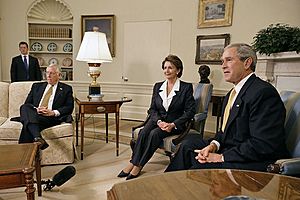
In the 2006 elections, the Democrats won control of the House of Representatives. This meant that as their leader, Pelosi would become the new Speaker. On January 4, 2007, she was officially elected, defeating Republican John Boehner. She was the first woman, the first Californian, and the first Italian-American to hold the job.
In her first speech as Speaker, she said, "For our daughters and granddaughters, today, we have broken the marble ceiling. For our daughters and our granddaughters, the sky is the limit."
Major Laws and Events
During her first speakership, Pelosi was a strong opponent of the Iraq War. She also worked to pass a number of major laws with President Barack Obama.
One of the most important was the Affordable Care Act (ACA), also known as "Obamacare." This law made major changes to the U.S. healthcare system. When it seemed like the bill might fail, Pelosi worked hard to gather enough votes to pass it in the House. President Obama later called her "one of the best speakers the House of Representatives has ever had."
Other key laws passed during this time included:
- The American Recovery and Reinvestment Act of 2009, a plan to help the economy during a recession.
- The Dodd–Frank Wall Street Reform and Consumer Protection Act, which created new rules for banks to prevent another financial crisis.
- The Don't Ask, Don't Tell Repeal Act, which allowed gay and lesbian people to serve openly in the military.
Return to Minority Leader (2011–2019)
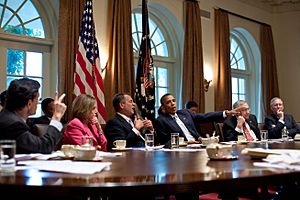
In the 2010 elections, the Republican Party won back control of the House. John Boehner became the new Speaker, and Pelosi returned to her role as House minority leader.
During this time, she continued to lead the Democrats. She defended the Affordable Care Act from Republican attempts to cancel it. She also called for new laws on gun control and for protecting the rights of immigrants.
In February 2018, Pelosi gave a speech on the House floor that lasted for more than eight hours. She read stories from "DREAMers"—young immigrants who were brought to the U.S. as children—to show her support for them. It was the longest speech in the history of the House of Representatives.
Second Time as Speaker of the House (2019–2023)
The Democrats won back the House in the 2018 elections, and Pelosi was elected Speaker for a second time. This made her the first person to return to the job since 1955.
Impeachments of President Trump
During her second speakership, the House of Representatives voted to impeach President Donald Trump twice. Impeachment is a process where Congress can charge a high-level official with a crime.
- The first impeachment happened in December 2019. The House charged President Trump with abuse of power and obstruction of Congress related to his dealings with Ukraine.
- The second impeachment happened in January 2021. The House charged him with inciting an insurrection after the attack on the U.S. Capitol.
In both cases, the Senate voted not to convict President Trump, so he was not removed from office.
COVID-19 and Other Laws
When the COVID-19 pandemic began in 2020, Pelosi led the House in passing the CARES Act. This law provided money to help families and businesses affected by the pandemic.
She also helped pass other major laws with President Joe Biden, including:
- The American Rescue Plan Act of 2021, another COVID-19 relief bill.
- The Infrastructure Investment and Jobs Act, a plan to repair roads, bridges, and other public works.
- The Inflation Reduction Act of 2022, which focused on climate change, healthcare costs, and taxes.
Life After House Leadership
In the 2022 elections, Republicans narrowly won back control of the House. After the election, Pelosi announced that she would not run for a leadership position again. She said it was time for a new generation to lead the House Democrats.
She continues to represent her district in San Francisco. The Democratic Caucus gave her the honorary title of "Speaker Emerita."
Political Positions
Pelosi is known for her liberal political views. She was a founding member of the Congressional Progressive Caucus.
- Human Rights: She has been a strong critic of China's human rights record. In 1991, she visited Tiananmen Square in Beijing to honor protesters who had been killed there.
- LGBT Rights: She has been a longtime supporter of LGBT rights. She voted against the Defense of Marriage Act in 1996 and supported the legalization of same-sex marriage.
- Environment: She believes climate change is a serious threat and has supported laws to reduce pollution and develop clean energy.
- Healthcare: She is a strong defender of the Affordable Care Act and has voted to expand programs like Medicare and Medicaid.
Personal Life
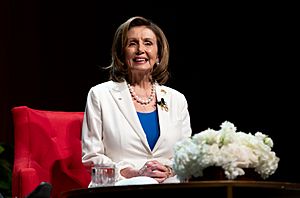
Nancy D'Alesandro married Paul Pelosi in 1963. They have five children and nine grandchildren. Two of her daughters, Christine and Alexandra, have also had public careers. Alexandra is a journalist and filmmaker.
Pelosi and her husband have become very wealthy, mostly through Paul Pelosi's career as an investor. This has led to some questions about whether members of Congress should be allowed to trade stocks.
In October 2022, an intruder broke into the Pelosis' San Francisco home and attacked her husband, Paul, with a hammer. He was seriously injured but recovered. Nancy Pelosi was in Washington, D.C., at the time of the attack.
Images for kids
-
Pelosi and Barack Obama shaking hands at the 2008 Democratic National Convention.
-
Pelosi speaking at the United States Department of Labor on Equal Pay Day.
-
Pelosi greets DREAMers fasting outside the Capitol, September 2017.
-
Pelosi and Representative Keith Ellison at his swearing-in ceremony with Thomas Jefferson's Quran in 2007.
-
Pelosi with Aung San Suu Kyi, Myanmar's pro-democracy leader, at a Congressional Gold Medal ceremony in 2012.
-
Capitol workers remove the portrait of former House Speaker Howell Cobb, who had served the Confederacy, from a wall in the U.S. Capitol.
-
President George W. Bush and Pelosi honoring 300 Tuskegee Airmen at the Capitol, March 2007.
-
President-elect Donald Trump with Pelosi in January 2017.
-
Pelosi and Rep. Debbie Wasserman Schultz have supported Venezuelan opposition leader Juan Guaidó.
-
Pelosi with Chinese premier Wen Jiabao during a trip to China in 2009.
-
Pelosi with Taiwanese president Tsai Ing-wen during her trip to Taiwan in 2022.
-
Pelosi and Secretary of State John Kerry at a baseball stadium in Havana, Cuba, March 2016.
-
Pelosi with Secretary of State John Kerry and Senators John McCain and Mark Warner in Riyadh, January 2015.
-
Pelosi with service members stationed at the Al Udeid Air Base in Qatar, 2010.
-
Pelosi and Israeli prime minister Benjamin Netanyahu in Jerusalem, January 2020.
-
Pelosi meeting with Russian president Dmitry Medvedev, foreign minister Sergey Lavrov, and ambassador Sergey Kislyak, June 2010.
-
The city of San Francisco named a street in Golden Gate Park in honor of Pelosi.
See also
 In Spanish: Nancy Pelosi para niños
In Spanish: Nancy Pelosi para niños
- Electoral history of Nancy Pelosi
- List of female speakers of legislatures in the United States
- Women in the United States House of Representatives
 | Delilah Pierce |
 | Gordon Parks |
 | Augusta Savage |
 | Charles Ethan Porter |


